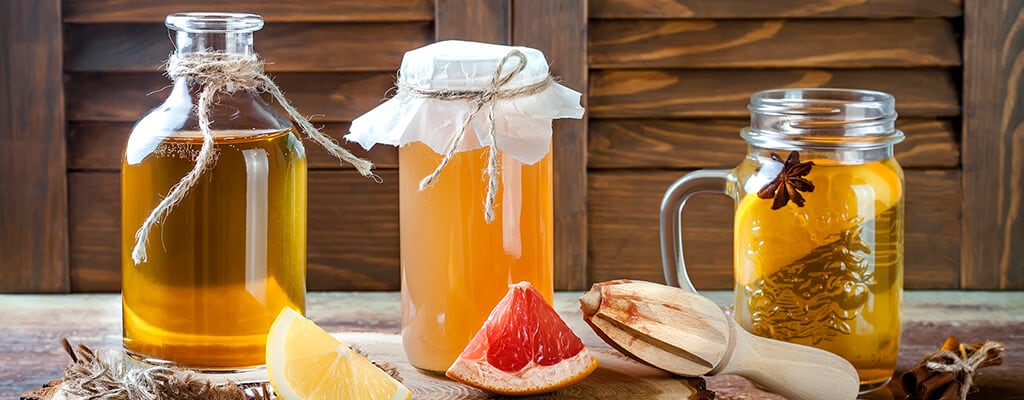Kombucha is a beverage that seems to be gaining popularity among many health conscious people. Although this fermented tea can now be found in some supermarkets, not everyone knows what it is and what its purported health benefits are. The fizzy golden tea has been consumed in China for approximately two thousand years, and was thought to improve digestion, increase immunity, boost metabolism and improve heart and liver function. Unfortunately, this otherwise healthy beverage may not be a good choice for people wanting to protect their dental health, and the reason lies in how the tea is made.
Kombucha tea is the result of black or green tea, yeast and sugar that has been fermented for a few weeks. The addition of live bacteria helps to create a slightly tart and sweet beverage that provides B Vitamins, antioxidants and probiotics. There are approximately 30 calories and 8 grams of sugar in a bottle of the tea, but it is the high acid content of the beverage that can damage tooth enamel.
Should You Stop Drinking Kombucha Entirely?
The fact that Kombucha tea could potentially be harmful to tooth enamel does not mean health enthusiasts need to avoid drinking it to get the other health benefits. The best way to prevent the tea from causing dental problems is to limit the time it is in contact with the teeth. This can be done by drinking the full serving at one time through a straw. Most people prefer to sip their tea slowly, but this method exposes the enamel to acid for a longer period of time. Drinking through a straw and following up with a thorough rinse of the mouth with water helps to minimize tooth damage while still providing the sought after health benefits.
Although most people who drink Kombucha tea regularly are convinced of its health benefits, the scientific evidence to support these claims are still lacking. It is also important to note that the beverage can be toxic if it is made improperly at home. The most common mistake is allowing the tea to ferment too long, so it is recommended that consumers of the beverage purchase their tea commercially.
Drinking Kombucha in Moderation
Naturally brewed tea does contain caffeine so Kombucha will also contain caffeine. This means that people who want to avoid caffeine should avoid the beverage or drink it in moderation. In addition to caffeine, Kombucha also contains alcohol due to the fermentation process. However, the alcohol content is not high enough to be felt by most people so is not thought to be a problem.
Although Kombucha tea is now widely available, nutritionists state there is not sufficient research to support the purported health benefits. For the most part, it seems the beverage is safe and can improve digestion and general well-being. One of the potentially long-term negative side-effects is the damage it do to tooth enamel. Consumers must weigh the health benefits against the negative effects when deciding whether or not to drink the golden beverage. Oral health is important to everyone, so drinking Kombucha should be done only as recommended and on a limited basis.
